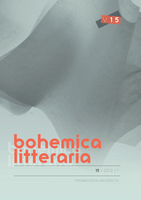Prozaická tvorba Františka Khola v souvislostech české povídkové produkce po roce 1910
The Prosaic Work of František Khol in the Context of Czech Short Story Production after 1910
Author(s): Eva ŠtědroňováSubject(s): Recent History (1900 till today), Short Story, Czech Literature, Theory of Literature
Published by: Masarykova univerzita nakladatelství
Keywords: Neoclassicism; neoclassical short story; realism; epic models of popular fiction; narration; František Khol;
Summary/Abstract: The article focuses on the prosaic works of František Khol, an almost forgotten author who made his literary debut together with the artists of the Čapek generation. It examines Khol’s belles lettres in the context of Czech short story production after 1910. For comparison, the author of the study employs two literary concepts of the period – neo-classicism, with which Khol’s prose is traditionally associated (he is often referred to as a grower of neoclassical short stories), and the invigorated realism of Otakar Theer. What the author drew upon in her comparison is above all a set of certain elements of popular fiction epic models. The article contains analyses of prosaic texts studied from the perspective of narrative practices; attention is also paid to issues of genre classification, and a significant part of the interpretation deals with the component of motif and theme. An analysis of Khol’s process of narration illustrates his more or less classical narrative concept, which differs from the experimental works of the Čapek brothers, or R. Weiner and F. Langer. That is why his inclusion in the context of searching neo-classicism is rather controversial. Unlike the above mentioned authors, with whom he is often listed in the same literary and historical context, Khol did not follow the path of ductile experiments, and of transformation of classical narration of model prosaic texts with philosophical overtones. Already in the early days of his work, he formed a fairly clear idea about his prose form. Primarily, his prosaic form was purposefully designed, with a tight composition, based on the storyline, with which characters, free from the psychological complexity and analyticity, create synthetic unity. He retained this form of writing throughout his writing life.
Journal: Bohemica litteraria
- Issue Year: 15/2012
- Issue No: 1
- Page Range: 47-79
- Page Count: 33
- Language: Czech

